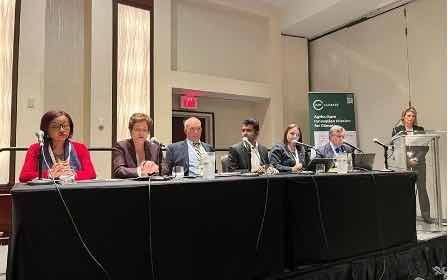The agrifood system contributes significantly to climate change, producing over 30% of global greenhouse gas (GHG) emissions. At the same time, climate-driven extreme weather and long-term changes in growing conditions around the globe threaten livelihoods, food and nutrition security, and ecological stability, with impacts falling most severely on women, youth, and vulnerable groups. One estimate suggests that climate change could put over 70 million more people at risk of hunger by 2050, adding to the 828 million people that faced hunger in 2021.
Given this complex relationship, it is critical to mitigate emissions from food systems and build their climate resilience. Over 110 countries around the world have established Nationally Determined Contributions (NDCs) to reducing emissions as part of the Paris Climate Agreement. Similarly, over 45 countries have established National Adaptation Plans (NAPs) under the Cancun Adaptation Framework (CAF), to adapt to changing temperatures, extreme weather, and other consequences of climate change. Meeting these commitments requires a fundamental shift in systems for producing, distributing, and consuming food, while simultaneously increasing production and diet quality for a growing global population.
With these formidable challenges in mind, the Inter-American Institute for Cooperation on Agriculture (IICA) hosted a breakout session on “Innovation for Integrating and Mainstreaming Agriculture in the NDCs” on May 10 at the Agricultural Innovation Mission for Climate (AIM4C) Summit in Washington. Policymakers from diverse regions came together to discuss strategies for accelerating innovation in agriculture for climate change mitigation and adaptation.
Challenges to develop innovations in the agricultural sector
Emily Weeks, Senior Policy Advisor, U.S. Agency for International Development (USAID) Bureau for Resilience and Food Security, introduced the breakout session underscoring that countries in all regions face major challenges when implementing their commitments to climate action. Panelists emphasized that inadequate policies hinder the scale-up of many promising innovations in the agricultural sector. Thus, there is a pressing need to modernize political and institutional systems to foster innovation, said Dina Esposito, Assistant to the Administrator, USAID Bureau for Resilience and Food Security: “New innovations and new technologies cannot reach the last mile […] unless government policies create the right enabling environment to make that possible.”
While the session covered many different themes, three critical institutional challenges stood out that must be addressed to successfully deploy these innovations: Strengthening coordination, expanding climate finance, and improving data monitoring and analysis.
Challenge 1: Strengthening coordination
To achieve key climate ambitions, it is essential to foster partnerships both within and across countries. IICA Director General Manuel Otero emphasized the need for enhanced coordination and alignment among countries, international organizations, the private sector, and civil society: “We cannot work independently of each other to tackle the climate crisis via science and innovation; it requires the effort of all institutions.”
There is no one-size-fits-all approach applicable to all countries, Esposito said, thus it is vital to identify strategies that work best in each country and foster collaboration to facilitate knowledge sharing between countries: “We recognize the importance of country-led policy implementation and the value in collaboration and countries learning from each other. Given that, we are committed to supporting not just country dialogues amongst stakeholders but also supporting cross country and cross regional learning and exchange—including peer to peer learning.”
Aadith Moorthy, founder and CEO of the soil carbon marketplace Boomitra, highlighted the importance of coordinated efforts in facilitating private sector engagement, particularly as many countries are currently formulating climate policies. Finally, Laura Suazo, Honduras Secretary of Agriculture and Livestock, underscored the significance of inter-sectoral coordination to simultaneously address climate change mitigation and adaptation.
Challenge 2: Expanding climate finance
Significant investment will be necessary to deploy climate technologies at scale, said William Hohenstein, Director of the Office of Energy and Environmental Policy, U.S. Department of Agriculture. Funding must come from multiple sources, he said, including governments, the private sector, and from consumers who are willing to pay slightly higher prices for more climate friendly products.
Climate finance policies and frameworks can play a vital role in leveraging these diverse sources of investment, facilitating access to funding for countries. This challenge is particularly significant for African countries, many of which face challenges in implementing their NDCs due to a lack of financial resources, said Josefa Sacko, African Union Commissioner for Agriculture, Rural Development, Blue Economy and Sustainable Environment. Carbon credits, for instance, can incentivize private sector engagement and serve as a source of foreign direct investment, assisting countries in achieving their NDCs. Suazo also emphasized the need to strengthen the reporting and monitoring of climate finance to facilitate its effective scaling up.
Challenge 3: Improving monitoring and analysis
Monitoring and reporting mechanisms in the agricultural sector should be expanded and strengthened, speakers said. Esposito emphasized the importance of incorporating high-quality data into policymaking processes. However, measuring, monitoring, and reporting agricultural sector GHG emissions reductions remains a challenge, Hohenstein said—a problem that can be addressed by adopting real-time data collection methods and implementing a standardized methodology to assess the impacts of changes in agricultural practices and techniques. Sacko stressed the significance of improving monitoring, reporting, and verification (MRV) systems to track progress in countries’ NDCs and enhance mutual accountability.
CACCI
Several speakers observed that the Comprehensive Action for Climate Change Initiative (CACCI) has been effective in helping countries to implement climate action. Using agriculture as an entry point, the initiative works with partners to design effective policies and institutions that support the implementation of innovative climate solutions. The initiative also works to build stakeholders’ capacity to plan, implement, and monitor these solutions.
CACCI is based on 4 pillars:
The CACCI activities will ultimately come together into a multifaceted portfolio of action to address climate challenges within and across countries.
More information on these pillars and the initiative can be found on the CACCI website.
Elsa Olivetti is a Research Assistant with IFPRI’s Markets, Trade and Institutions Unit (MTI); Brian McNamara is an MTI Program Coordinator.







